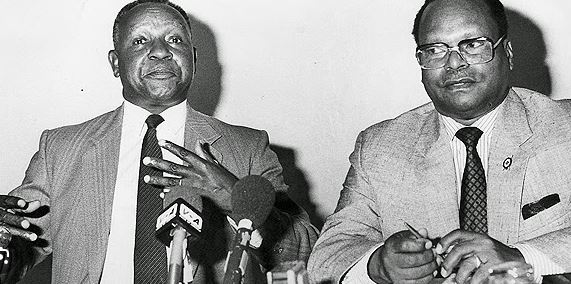Saba Saba, also known as July 7th, holds immense historical significance in Kenya's fight for freedom and democracy. It marks the genesis of a nation's unified struggle as Kenyans came together to demand their rights, giving birth to a legendary day etched in the country's collective memory.
The story began 33 years ago, on July 7, 1990, when Kenyans took to the streets with a resolute voice, demanding free and fair elections, as well as the restoration of multiparty democracy. The catalysts behind this movement were two politicians, Kenneth Matiba and Charles Rubia. However, just days before the planned protests, they were arrested on July 4, 1990.
Ironically, the government's efforts to suppress the call for the rally seemed to only intensify citizens' determination. Despite stringent measures and warnings, the anticipation and excitement surrounding the event continued to grow.
The core demands of the protesters were the reinstatement of multiparty democracy and the release of Matiba, Rubia, and all other political detainees. On the day of the rally, thousands of Kenyans from all corners of Nairobi converged on Kamukunji, defying obstacles and united in their pursuit of change. Despite State warnings, the media played a crucial role in documenting the event extensively.
The day unfolded as a mix of violent confrontations between the police and the demonstrators. The riots spread from slum areas in Nairobi to parts of Thika, Nakuru, Kiambu, and Nyeri. The crackdown on opposition leaders commenced, resulting in the arrest of those who had not fled the country.
Key figures actively involved in the Saba Saba protests included Raila Odinga, Gitobu Imanyara, Kiraitu Murungi, Paul Muite, Mukhisa Kituyi, and Lawyer Gibson Kamau Kuria, alongside Rubia, Matiba, Martin Shikuku, and Masinde Muliro. These individuals faced beatings and detention under the regime of the then-tyrannical dictator, President Moi.
The resistance movement was not limited to political leaders alone. Organizations such as the Federation of Kenya Women Lawyers, spearheaded by Martha Koome, Abida Aroni, Nancy Baraza, and Martha Karua, also played a significant role in advocating for change.
In present-day Kenya, Saba Saba has evolved into a powerful symbol, with human rights defenders (HRDs) and civil society organizations championing its ideals. Groups like Inuka Kenya Ni Sisi, Kenya Human Rights Commission, National Coalition for Human Rights Defenders, the Social Justice Centres' Working Group, and Mathare Social Justice Center are actively calling for the respect of the constitution, an end to police brutality and killings, and a favorable legal and policy environment in the country.
On the 33rd anniversary of Saba Saba, Raila Odinga is poised to ignite a fresh wave of anti-government protests, further galvanizing the spirit of resistance. These demonstrations will serve as a testament to the enduring legacy of Saba Saba and its ongoing relevance in the struggle for justice, human rights, and a more democratic Kenya.

